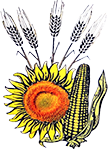DNA Markers Assisted Selection for Accumulation/Pyramiding of Disease Resistance Genes in Wheat Lines
Daniel Cristina, Alina-Gabriela Turcu, Cristina-Mihaela Marinciu,Gabriela Șerban, Indira Galit, Elena-Laura Conțescu, Vasile Mandea, Alexandru-Leonard Dumitru, Matilda Ciucă
National Agricultural Research and Development Institute Fundulea
Keywords: rust, Septoria tritici blotch, molecular markers, KASP, wheat.
Abstract: Wheat yield is affected by a number of diseases whose impact and spread are directly affected by climate changes. Cereal rust caused by the Puccinia triticina, Puccinia striiformis f. sp. tritici and Puccinia graminis f. sp. tritici, as well as septoria tritici blotch (STB) caused by Zymoseptoria tritici/Mycosphaerella graminicola are the main diseases of wheat. Durable disease resistance of wheat is a significant component of food security and a major goal of breeders. The accumulation/pyramiding of disease resistance genes in new wheat varieties is the main strategy for improving of wheat disease resistance. In this study, 46 wheat lines (F5 and F6 generation) were analyzed using molecular markers (DNA) in order to select the wheat lines with two, three, four or five diseases resistance alleles: Lr34/Yr18//Sr57/Pm38/Ltn1/Bdv1, Lr37/Yr17/Sr38, Lr46/Yr29//Sr58/Ltn2, Lr68/Ltn4 and Stb16q.
The results, based on molecular markers assays, showed the accumulation/pyramiding of the homozygous resistance alleles in following combinations: Lr34+Lr46 (one line), Lr37+Lr46 (2 lines), Lr46+Lr68 (2 lines).
Allelic combinations, with heterozygous/heterogeneous alleles (H), were also, highlighted: Lr34(H)+Stb16q; Lr37+Lr46(H); Lr34(H)+Lr37+Lr46; Lr37(H)+Lr46+Stb16q; Lr34(H)+Lr37+Lr68(H); Lr34(H)+Lr37(H)+Lr46+Lr68(H) and Lr34+Lr37+Lr46+Lr68(H)+Stb16q.
Markers assisted selection on each plant from the wheat line with the allelic combination Lr34+Lr37+Lr46+Lr68(H)+Stb16q allowed the selection of this homozygous combination. This study proves the value of the wheat breeding strategy, based on selection assisted by DNA markers, to accelerate the development of new wheat varieties resistant to rust and septoria tritici blotch.
